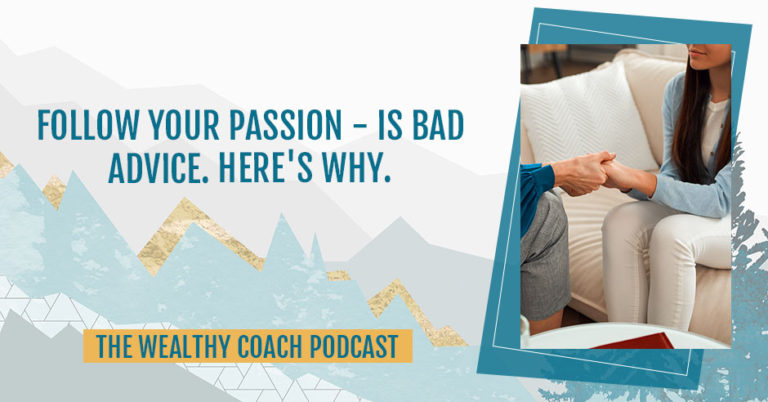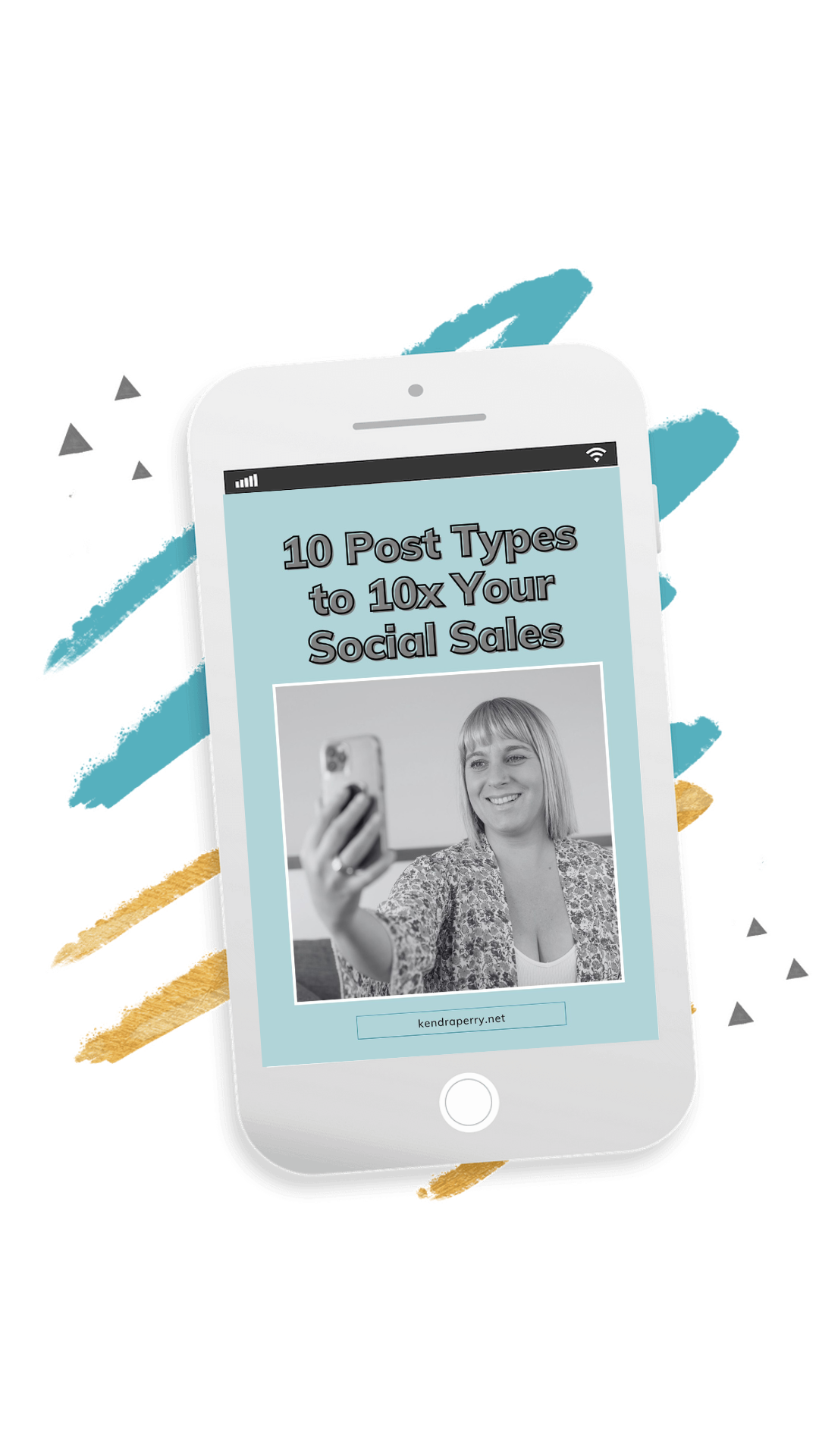The ultimate satisfaction is not just in pursuing your passion as a profession, but in establishing a career or enterprise that enables you to embrace your passion on your terms. In this eye-opening episode, host Kendra Perry challenges the cliché advice to “follow your passion.” She shares a personal journey that proves why blindly pursuing your passion may not lead to the fulfilling and prosperous career you envision. In a refreshing twist, Kendra presents a thought-provoking alternative. Instead of trying to turn your passion into a job, it’s better to look for a business or career that fits your strengths, gives you flexibility, and lets you have the lifestyle you want. Discover why separating your passion from your profession can actually lead to greater fulfillment and happiness. Don’t miss out!
DM me the word ‘biz audit’ on Instagram (https://instagram.com/kendraperryinc) or Facebook (https://facebook.com/kendraperryinc) to get your free business audit and determine if you’re a fit for Health Coach Accelerator
Learn how to make a full time in your wellness business with my free training: https://go.kendraperry.net/training
Leave the podcast a 5-star review: https://ratethispodcast.com/wealthy
—
Listen to the podcast here
Follow Your Passion – Is BAD Advice. Here’s Why.
The other day I was hanging out with one of my very good friends. She’s in a bit of a career transition. She was previously working as a wildland firefighter for maybe the past ten years, and then she’s recently transitioned to having her own falling business. If you don’t know what falling is, it essentially means cutting down trees. She’s a very badass friend of mine. She is such a badass. It’s a physical job. She knew that while it was okay for now, it wasn’t a good long-term plan because it was going to be harder on her body as she gets older, but she wasn’t sure where to go next. I asked her, “What are you good at?” She said, “I’m good at organization and I’m good at analyzing numbers.”
I said, “Have you considered doing a bookkeeping course?” She said that she had and said, “I was thinking about that, but when I brought it up with my colleagues, they poo-pooed it. They told me that I would have to be in front of a computer all the time, I would hate it, it was a bad idea, and I should pursue a career in something I was more passionate about.” I told her that this was bad advice. Following your passion is bad advice. Why did I say that? Isn’t there a quote that says, “Follow your passion and you’ll never work a day in your life?” I used to believe that.
When I was growing up in high school, I never fit into that 9:00 to 5:00 box. I remember hating the Monday-to-Friday schedule. I found it exhausting and I hated that I was always waiting for the weekend and dreaming of the weekend. On Friday, I was like, “This is the best day ever.” Saturday I was still pretty pumped, and then Sunday I was depressed. I was dreading Monday, and then I do it all over again. I remember being in career class in high school and thinking, “I don’t understand how I’m supposed to choose a career that looks a lot like the schedule that I’m having now. I hate this. Am I going to go to school and then do this for the rest of my life? I don’t want to do this.” I couldn’t figure out what else to do.
I went to high school in the early 2000s and there weren’t a lot of options. It was like, “Do you want to be a doctor? Do you want to be a teacher?” I remember even back then that going into the trades was considered the dumb thing to do because I did grade thirteen. I’m from Ontario, and there used to be this thirteenth grade, which I was the last year to do it. If you wanted to go to college and go to trade school to be an electrician or a plumber or something like that, you could graduate after grade twelve and go to college. If you wanted to go to university and go more the academic route, then you would do grade thirteen.
We thought of ourselves as the smart ones, and it was dumb to go to college, which is silly looking back now because the tradespeople probably got good jobs that paid way better than anything you could get out of most university jobs. There weren’t a lot of options presented. I remember my two best friends, Lauren and Tanya, wanted to be teachers. Since I became friends with them in ninth grade, they wanted to be teachers. They ended up becoming teachers. I was creeping on Lauren’s stories on Instagram the other day, and she’s still a teacher.
They knew what they wanted to do, but I was all over the map. I was like, “Do I want to be a vet? Do I want to be a doctor? Do I want to be a policeman?” I had all these ideas and I couldn’t figure it out because all of them seemed like they would have that Monday-to-Friday schedule, which I hated. I wanted to do something that I felt passionate about. What I decided on was to go into this program called Outdoor Pursuits, which was essentially learning how to be an outdoor guide in a whole bunch of different activities like climbing, canoeing, hiking, and all kinds of things. I wanted to go to the University of Calgary for that. They had this four-year program.
Looking back now, it’s a silly thing to go to university for it. It’s a lot of money for something that ultimately doesn’t pay well, but I didn’t care about the money at that point when I was eighteen. I just wanted to do something I felt passionate about. Unfortunately, that year that I applied to go to university, they had cut the program and sent it to a college in Calgary. Looking back, everything is so clear in hindsight. I should have gone to that college but my mindset at the time was that college was for stupid kids. I was a smart kid and I had to go to university.
I still ended up going to the University of Calgary. I ended up in Kinesiology because I thought, “Maybe I could go into something like sports nutrition,” because I’m passionate about nutrition. After a year and a half in Kinesiology, it didn’t resonate with me. I ended up going into Environmental Science. What that led to after I graduated from university was going into seasonal forestry work. I started seasonal forestry work in my second year of university. I came from a small town, like a county. We didn’t even have a town. There wasn’t even a store. We literally had one streetlight. We used to congregate around it and smoke cigarettes.
I wanted to live in a city because I lived so rurally. You had to drive everywhere and drive across so many farmlands. I wanted to move to the city. I remember spending my first summer after university in the city and I was like, “This sucks. This is boring. There’s no lake. There’s nowhere to swim. It’s hot.” I wasn’t into it. That following summer I went tree planting. Essentially, what you do is you carry these three bags around your waist. You fill them with trees that are probably 50 pounds or maybe even more. You’re carrying 100 trees at once, and you get paid per tree. You plant these trees into the ground. You try to go as fast as possible because you get paid per tree anywhere from maybe $0.10 a tree to $0.30 per tree, depending on the type of ground you’re working on.
If it’s easy ground and there are not a lot of sticks and logs down, it’s easy to plant. You’re going to get paid a lower price, versus where there’s a lot of slash and logs. It takes a lot longer to plant a tree and you’re going to get paid a higher price to plant that tree. I ended up in forestry because I started tree planting every summer. That opened the door to other jobs within forestry.
The reason why I pursued that work is because I was passionate about the outdoors. I loved being outside and I didn’t want to work indoors. The other reason I pursued that job is because it was physical, and I was passionate about exercise and fitness. That was the reason why I pursued that job. The other reason was because it didn’t follow that regular schedule.
We worked hard when we were working, but it wasn’t year-round work. With tree planting, you pick up contracts. You work contract to contract. I could work a spring contract from maybe April to the end of July, and then I could work a fall contract on the coast, and then I could even work a winter contract on the coast. I could pick up the work when I want and make a bunch of money because I was very good at it. I was very fast. I used to make $300 or $400 a day, and then I could take time off. I could go traveling. I could road trip, cruise around, and do my thing. Eventually, what that led to is me designing cut blocks for logging operations.
When they cut down the forest, in order for them to cut down the forest, they need a plant. I would design the perimeter, create the boundary around bodies of water like lakes or streams, and create wildlife tree patches. I would design the whole thing. This was a seasonal job. I’d work from about April to October. I love that because then I’d take the entire winter off and I’d be able to ski. Eventually, because I’m a passionate skier, I grew up skiing my whole life. I competed internationally. I thought maybe I could ski professionally. I could get paid to be in photos and movies. Maybe I could also be a ski guide.
I started going through courses to become a ski guide because I was like, “I’m so passionate about skiing. Wouldn’t it be fun to get paid to ski?” I could do that in the winter. In the summer, I could do my forestry job because I’m passionate about the outdoors. This is what happened. Working outdoors prevented me from spending time outdoors in my spare time. Pursuing ski guiding made me realize that I was starting to hate skiing. Both careers didn’t pay well. They both led to me working my ass off for very little money.
Ultimately, what happened is following my passion started to make me resent my passion and make me work my ass off for very little money and have very little time to do the things I wanted to be doing. I know this won’t be true for everyone. I know some people who did the guiding courses with me who became ski guides. They still love it and they still love skiing. For me, following my passion led to me being broke, burnt out, and spending less of my free time skiing and being outdoors. The truth was when you have a physical job, I’m walking around the mountains and hiking around the bush all day.
You have to imagine when you’re working in forestry, I’m hiking around the forest, I’m not hiking on trails. I am bushwhacking. There are brush, thorns, and trees down. I’m falling on my face. I’m getting scratched. I have to think about bears and all of these things. When I was ski guiding, I didn’t get to ski where I wanted to go. I had to be at the end of the pack. I had to keep my eyes on all of the other skiers and all of the clients. I was a glorified babysitter. I’d have to do something called break trail, which means that when you’re ski touring, so when you’re hiking on your skis, your heels release and you’re hiking on your skis.
When you do that in fresh snow, it’s exhausting. I would have to be the one to break the trail. When I was being so physical in my job, I would come home on the weekend. Instead of going biking, climbing, or hiking, all I wanted to do was lie around on the couch. It was interesting. At the end of April, I was up north because I used to do a lot of this forestry work in this small northern town called Cornell. One of my best girlfriends still lives up there. I flew up there at the end of April to visit her. In the outlying areas of this town called Cornell are these beautiful mountains, and I lived up there with her for years.
We were driving around and I was like, “It’s funny. There are these amazing mountains not too far from here, but we never went there. Not once. Why didn’t we ever go there?” She was like, “Because we were exhausted.” We worked so hard all week on the weekend that all we wanted to do was lie around and watch movies, and then maybe go drinking. Working outdoors and following my passion was exhausting because it was so physical that on the weekend, I didn’t want to do any of the things I loved. If I did manage to get a little bit of energy to go biking or climbing, it was exhausting. I was tired and I didn’t enjoy it as much.
It was interesting because following my passion led to me doing less of my passion. The truth is your passion might not be profitable as a business, or it might not lead to a lucrative career. It could lead to feeling less passionate in the long run. This is why I told my friend who was struggling to find her next step in her career that following her passion was a bad idea. Like me, she’s passionate about the outdoors. That’s why she did firefighting. That’s why she started her falling business. Bookkeeping would allow her to work for herself, make her own hours, and work less than she was working as a firefighter or a faller. It also had the potential to make her more money in the long run because she can set her own rate.

This would allow her more freedom and more energy to spend time doing her passion outdoors. She could get up early and work for six hours in the morning, be done early, and spend the rest of the day dirt biking, skiing, mountain biking, or even hanging out at the beach. I don’t think your job or your business needs to be your passion. You need to like it. You need to enjoy it, but I think it’s better to save your passions for your free time when you can do them on your own terms without expectations from others. A lot of people wonder how I can work on a computer.

When I tell them I run an online business, many people are like, “I don’t know how you spend so much time on a computer.” The truth is I don’t. I work about 25 hours a week. I run my day how I want. In the winter, I ski every morning and I work in the afternoons. In the summer I get up early and maybe work from 7:00 to 12:00 or maybe 1:00, and then I finish for the day. I go hiking or biking or I go to the beach. I often take Fridays off. I work when it’s raining and I take the day off when it’s sunny. Does being in front of a computer suck sometimes? Sure. Every job sucks sometimes. Every job requires you to do things you don’t enjoy. That’s life.
Your business isn’t going to be fun all the time, but the freedom and flexibility this business allows me to make it more than worth the 25 hours of computer time I do every week. The payoff is so big that I never complain about it. I don’t even mind it because of the freedom that I have in my life. Rather than following your passion, I think that we should pursue a business or a career that allows us to have the lifestyle that we want because the moments and the fulfillment don’t usually happen in the work we do, but it happens in the way that we spend our free time.
Do I love what I do in my business? Yeah, about 90%. I love what I’m doing. I love supporting my students. I love creating content. I love seeing Stripe notifications come up on my phone when I make a sale. I love building funnels, recording podcasts, and working with my team, but there are still things I hate doing. I don’t like all the decision-making sometimes. It’s exhausting. I don’t like dealing with problems. I don’t like admin stuff. Sometimes the responsibility can feel a bit heavy, but I do love it deeply.
What I will say is I’m way more passionate about being in the mountains with my friends and partner. I’m way more passionate about adventuring outdoors. I’m way more passionate about eating good food and taking care of my body. The sacrifice that I make to run this business is more than worth it to be able to lead a very low-stress life of adventure, fun, connection, and nature. My business is what allows me to pursue my passions fully. Don’t follow your passion, find a business idea that compliments your strengths, one that you enjoy doing, and use it to create freedom, wealth, and flexibility so you can be fully fulfilled doing your passions in your
free time.

I hope you enjoyed this episode. If you like this episode, you can let me know by taking a screenshot and sharing it with your Instagram stories, and tagging it at @KendraPerryInc. I would love to know the biggest take-home from this episode. If you want to leave me a five-star review on iTunes, you can go to RateThisPodcast.com/wealthy. Thank you so much. I will see you in the next episode where I help you become wealthy AF.
DM me the word ‘biz audit’ on Instagram, https://Instagram.com/kendraperryinc
or Facebook, https://Facebook.com/kendraperryinc to get your free business audit and determine if you’re a fit for Health Coach Accelerator
Learn how to make a full-time in your wellness business with my free training: https://Go.KendraPerry.net/training
Leave the podcast a 5-star review: https://RateThisPodcast.com/wealthy






